|
|
|
Sort Order |
|
|
|
Items / Page
|
|
|
|
|
|
|
| Srl | Item |
| 1 |
ID:
051622


|
|
|
| 2 |
ID:
004332
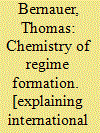

|
|
|
|
|
| Publication |
Aldershot, Dartmouth, 1993.
|
| Description |
xii, 480p.; tables
|
| Standard Number |
1855213494
|
|
|
|
|
|
|
|
|
|
|
|
Copies: C:1/I:0,R:0,Q:0
Circulation
| Accession# | Call# | Current Location | Status | Policy | Location |
| 035030 | 327.174/BER 035030 | Main | On Shelf | General | |
|
|
|
|
| 3 |
ID:
110816
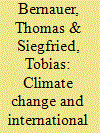

|
|
|
|
|
| Publication |
2012.
|
| Summary/Abstract |
We engage in a critical assessment of the neo-malthusian claim that climatic changes can be an important source of international tensions, in the extreme even militarized interstate disputes. The most likely scenario is conflict over water allocation in international catchments shared by poorer, less democratic, and politically less stable countries, governed by weak international water management institutions, and exposed to severe climatic changes. The Syr Darya corresponds quite well to all these characteristics. If the neo-malthusian specter of conflict over water is empirically relevant, we should see signs of this in the Syr Darya. The riparian countries of the Aral Sea basin have experienced international disputes over water allocation ever since the USSR collapsed and, with it, existing water management institutions and funding. The worst such dispute concerns the Syr Darya, one of the two largest rivers in Central Asia. Based on hydrological data and other information we find that the only existing international water management institution in the Syr Darya has failed. Based on a coupled climate, land-ice and rainfall-runoff model for the Syr Darya, we then examine whether, in the absence of an effective international water allocation mechanism, climate change is likely to make existing international tensions over water allocation worse. We find that climate change-induced shifts in river runoff, to which the Uzbek part of the Syr Darya catchment is particularly vulnerable, and which could contribute to a deterioration of already strained Kyrgyz-Uzbek relations, are likely to set in only in the medium to long term. This leaves some time for the riparian countries to set up an effective international framework for water allocation and prevention of climate-induced geohazards. By implication, our findings suggest that a climate change-induced militarized interstate dispute over water resources in Central Asia is unlikely.
|
|
|
|
|
|
|
|
|
|
|
|
|
|
|
|
| 4 |
ID:
110809


|
|
|
|
|
| Publication |
2012.
|
| Summary/Abstract |
Despite many claims by high-ranking policymakers and some scientists that climate change breeds violent conflict, the existing empirical literature has so far not been able to identify a systematic, causal relationship of this kind. This may either reflect de facto absence of such a relationship, or it may be the consequence of theoretical and methodological limitations of existing work. In this article we revisit the climate-conflict hypothesis along two lines. First, we concentrate on indirect effects of climatic conditions on conflict, whereas most of the existing literature focuses on direct effects. Specifically, we examine the causal pathway linking climatic conditions to economic growth and to armed conflict, and argue that the growth-conflict part of this pathway is contingent on the political system. Second, we employ a measure of climatic variability that has advantages over those used in the existing literature because it can presumably take into account the adaptation of production to persistent climatic changes. For the empirical analysis we use a global dataset for 1980-2004 and design the testing strategy tightly in line with our theory. Our empirical analysis does not produce evidence for the claim that climate variability affects economic growth. However, we find some, albeit weak, support for the hypothesis that non-democratic countries are more likely to experience civil conflict when economic conditions deteriorate.
|
|
|
|
|
|
|
|
|
|
|
|
|
|
|
|
| 5 |
ID:
085329


|
|
|
|
|
| Publication |
2008.
|
| Summary/Abstract |
Many case studies and some large-N research have shown that upstream-downstream cooperation in international river basins occurs quite frequently. The same holds for global water governance efforts more generally. Yet such findings are blind in one eye because they focus primarily on political commitments or compliance with international agreements. A policy performance metric (PER) allows for a more substantive assessment of success or failure in international water governance. To test its usefulness, this article applies this metric to the Naryn/Syr Darya basin, a major international river system in Central Asia. Management of the Toktogul reservoir, the main reservoir in the Naryn/Syr Darya basin, was internationalized in 1991 when the Soviet Union collapsed. Compliance with an international agreement, concluded in 1998, has been quite high. This agreement establishes an international trade-off between water releases for upstream hydropower production in winter and water releases for downstream irrigation in summer. However, performance of this agreement over time has been very low and highly variable. The management system in place is therefore in urgent need of reform. Studies of international and global water governance should pay more attention to the degree to which political commitments actually further de facto problem solving.
|
|
|
|
|
|
|
|
|
|
|
|
|
|
|
|
| 6 |
ID:
128869


|
|
|
|
|
| Publication |
2014.
|
| Summary/Abstract |
This article reviews the existing theoretical arguments and empirical findings linking renewable and non-renewable natural resources to the onset, intensity, and duration of intrastate as well as interstate armed conflict. Renewable resources are supposedly connected to conflict via scarcity, while non-renewable resources are hypothesized to lead to conflict via resource abundance. Based upon our analysis of these two streams in the literature, it turns out that the empirical support for the resource scarcity argument is rather weak. However, the authors obtain some evidence that resource abundance is likely to be associated with conflict. The article concludes that further research should generate improved data on low-intensity forms of conflict as well as resource scarcity and abundance at subnational and international levels, and use more homogenous empirical designs to analyze these data. Such analyses should pay particular attention to interactive effects and endogeneity issues in the resource-conflict relationship.
|
|
|
|
|
|
|
|
|
|
|
|
|
|
|
|
| 7 |
ID:
091726


|
|
|
| 8 |
ID:
118530


|
|
|
|
|
| Publication |
2012.
|
| Summary/Abstract |
The dominant explanation of public attitudes vis-à-vis economic globalisation focuses on re-distributional implications, with an emphasis on factor endowments and government-sponsored safety nets (the compensation hypothesis). The empirical implication of these theoretical arguments is that in advanced economies, on which this article focuses, individuals endowed with less human and financial capital will be more likely to experience income losses. Hence they will oppose economic openness unless they are compensated by the government. It is argued here that including social capital in the analysis can fill two gaps in explanations relying on factor endowments and the compensation hypothesis. First, generalised trust - one key aspect of social capital - constitutes a personal endowment alongside human and financial capital. Second, structural social capital - another key aspect of social capital - can be regarded as a nongovernmental social safety net that can compensate for endowment-related disadvantages of individuals. Both aspects of social capital are expected to contribute, for distinct reasons, to more positive views on economic openness. The empirical testing relies on survey data for two countries: Switzerland and the United States. For both countries, the results indicate that generalised trust has a strong, positive effect on public opinion of economic globalisation, whereas structural social capital has no effect.
|
|
|
|
|
|
|
|
|
|
|
|
|
|
|
|
| 9 |
ID:
133013


|
|
|
|
|
| Publication |
2014.
|
| Summary/Abstract |
Many advanced industrialized countries have, in recent years, experienced a significant expansion of electricity production from renewables. Yet we know quite little about the dynamics of the underlying policychoices in this area. Using new data on adoptions and changes in feed-in tariff and green certificate schemes in 26 advanced industrialized countries over 20 years, we examine both domestic driving forces as well as international determinants. The findings suggest that three factors play a particularly important role in pushing countries towards market-based support systems: characteristics of the existing energy supply system, a federalist structure of the political system, and EU membership. Particularly noteworthy is the finding that higher shares of fossil and nuclear energy in the national energy supply as well as higher CO2intensity of the economy do not, as we had expected, stand in the way of policies for supporting renewables in electricity production. To the contrary, they increase the likelihood of a country adopting such policies. We also find, however, that higher economic growth and higher growth in solar and wind energy capacity tend to reduce the political appetite for reforms of existing schemes.
|
|
|
|
|
|
|
|
|
|
|
|
|
|
|
|
| 10 |
ID:
002430


|
|
|
|
|
| Publication |
New York, United Nations, 1989.
|
| Description |
v, 36p.
|
| Series |
United Nations Institute for Disarmament Research paper; no. 5
|
| Standard Number |
929045038X
|
|
|
|
|
|
|
|
|
|
|
|
Copies: C:1/I:0,R:0,Q:0
Circulation
| Accession# | Call# | Current Location | Status | Policy | Location |
| 031667 | 355.8245/BER 031667 | Main | On Shelf | General | |
|
|
|
|
| 11 |
ID:
004193
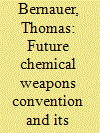

|
|
|
|
|
| Publication |
New York, United Nations, 1989.
|
| Description |
36p.
|
| Series |
United Nations Institute for Disarmament Research paper; no.5
|
| Standard Number |
929045038X
|
|
|
|
|
|
|
|
|
|
|
|
Copies: C:1/I:0,R:0,Q:0
Circulation
| Accession# | Call# | Current Location | Status | Policy | Location |
| 034827 | 355.8245/BER 034827 | Main | On Shelf | General | |
|
|
|
|
| 12 |
ID:
102568
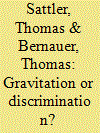

|
|
|
|
|
| Publication |
2011.
|
| Summary/Abstract |
The strong presence of large countries in World Trade Organisation (WTO) dispute settlement and the absence of very poor ones have raised concerns that increasing legalisation in the global trading system has not diminished discrimination against less powerful countries as much as expected. This article examines dispute initiations in all WTO member state dyads in 1995-2003 to shed more light on this issue. The analysis suggests that the main driver of dispute initiation is a gravitational one: larger economies and bigger traders are more likely to become involved in trade disputes primarily because their economies are more diversified, and also because greater market size makes them more attractive targets of litigation. While evidence is not found for discriminatory effects against countries with small legal capacity, the results of the article point to a more complex form of power bias - namely a preponderance effect. They suggest that disputes among country dyads including a much more powerful defendant than complainant or vice versa are dealt with outside the WTO. This finding is potentially worrying because it is, arguably, easier to reduce legal capacity differences than to reduce power differences.
|
|
|
|
|
|
|
|
|
|
|
|
|
|
|
|
| 13 |
ID:
150665
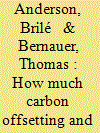

|
|
|
|
|
| Summary/Abstract |
A fundamental policy design choice in government-led climate change mitigation is: what role should flexibility mechanisms like carbon offsetting play in reducing greenhouse gas (GHG) emissions. Since public opinion affects the policy choices of government, we investigate how arguments regarding carbon offsetting's economic efficiency, effectiveness, and ethicality, which have been key points in the public debate, impact the public's preferences. We fielded an online framing experiment in the United States (N=995) to empirically identify how arguments for and against carbon offsetting influence public preferences for the inclusion of offsetting in national GHG mitigation policy. We find that the public's support for international offsetting increases and support for reductions at their source (i.e. within firms' own operations) diminishes when considerations of economic efficiency gains are at the forefront. Support for offsetting declines when individuals are confronted with arguments concerning its effectiveness and ethicality, which suggests that future policies will require clear standards of additionality in order to address these concerns. Moreover, we find that how carbon offsetting is framed matters even amongst climate skeptics and support could potentially be enhanced via improved communication on efficiency gains.
|
|
|
|
|
|
|
|
|
|
|
|
|
|
|
|
| 14 |
ID:
095322
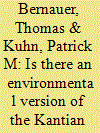

|
|
|
|
|
| Publication |
2010.
|
| Summary/Abstract |
We examine whether there is an environmental version of the Kantian peace; that is, whether democracies that trade and are bound by international treaties are less likely to harm each other environmentally. Specifically, we study five factors that are likely to help in reducing beggar-thy-neighbour behaviour in terms of transboundary pollution: democracy, supranational institutions, trade relations, stringency of domestic environmental policy and international environmental commitment. The empirical focus is on upstream-downstream water pollution in Europe in 1970-2003. The observed effects of the five variables differ considerably across forms of pollution and definitions of beggar-thy-neighbour behaviour. Some of our explanatory variables contribute to reducing beggar-thy-neighbour behaviour. Hence there is some empirical support for the environmental Kantian argument. Nonetheless, state behaviour in this area remains characterized by free-riding incentives; the forces of democracy, trade and national and international regulation and institutions do not easily produce decent international behaviour.
|
|
|
|
|
|
|
|
|
|
|
|
|
|
|
|
| 15 |
ID:
090135


|
|
|
|
|
| Publication |
2009.
|
| Summary/Abstract |
The effects of defense spending on economic performance and, in particular, on economic growth have been studied extensively in the literature. The empirical findings have been ambiguous so far, partly reflecting the econometric difficulties involved in the estimation of this relationship. The authors study the implications of Swiss defense spending for economic growth and unemployment in Switzerland, using both national aggregate and cross-sectional (cantonal) data. Such analysis may be more informative than similar analyses that rely on time series for individual countries (due to spurious time effects) or averages for different countries (due to strong cross country variation in country characteristics). The findings indicate that although defense spending has had a positive effect on the rate of economic growth of Switzerland in the presence of an external threat (Cold War), the distribution of defense spending across cantons has not contributed to the dispersion of cantonal growth rates. Nonetheless, cantons in which military employment is a large share of total employment have enjoyed lower and more stable unemployment rates. These findings suggest that in order to uncover the full implications of defense spending, it is necessary to go beyond the defense spending-growth nexus. The findings seem relevant for many other countries because the allocation of national defense employment and spending is rarely uniform across the regions of any country.
|
|
|
|
|
|
|
|
|
|
|
|
|
|
|
|
| 16 |
ID:
090439
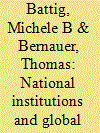

|
|
|
|
|
| Publication |
2009.
|
| Summary/Abstract |
This article examines whether democracies contribute more to the provision of global public goods. It thus contributes to the debate on the effects of domestic institutions on international cooperation. The focus is on human-induced climate change, in Stern's words "the biggest market failure the world has ever seen." Using new data on climate change cooperation we study a cross-section of 185 countries in 1990-2004. The results show that the effect of democracy on levels of political commitment to climate change mitigation (policy output) is positive. In contrast, the effect on policy outcomes, measured in terms of emission levels and trends, is ambiguous. These results demonstrate that up until now the democracy effect has not been able to override countervailing forces that emanate from the free-rider problem, discounting of future benefits of climate change mitigation, and other factors that cut against efforts to reduce emissions. Even though democracies have had a slow start in moving from political and legal commitments (policy output) to emission reductions (policy outcomes), particularly in the transportation sector, we observe some encouraging signs. The main implication of our findings for research on international politics is that greater efforts should be made to study policy output and outcome side by side. This will help in identifying whether more democratic countries experience larger "words-deeds" gaps also in other policy areas, and whether there are systematic differences of this kind between domestic and international commitments and across different policy areas.
|
|
|
|
|
|
|
|
|
|
|
|
|
|
|
|
| 17 |
ID:
003102
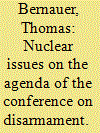

|
|
|
|
|
| Publication |
New York, United Nations, 1991.
|
| Description |
x, 109p.
|
| Series |
UNIDIR/91/68
|
| Standard Number |
929045055X
|
|
|
|
|
|
|
|
|
|
|
|
Copies: C:1/I:0,R:0,Q:0
Circulation
| Accession# | Call# | Current Location | Status | Policy | Location |
| 034799 | 355.825119/BER 034799 | Main | On Shelf | General | |
|
|
|
|
| 18 |
ID:
027269
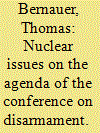

|
|
|
|
|
| Publication |
New York, United Nations., 1991.
|
| Description |
viii, 109p.
|
| Standard Number |
929045055X
|
|
|
|
|
|
|
|
|
|
|
|
Copies: C:1/I:0,R:0,Q:0
Circulation
| Accession# | Call# | Current Location | Status | Policy | Location |
| 033359 | 341.734/BER 033359 | Main | On Shelf | General | |
|
|
|
|
| 19 |
ID:
002753
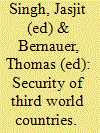

|
|
|
|
|
| Publication |
Aldershot, Dartmouth Publishing Company, 1993.
|
| Description |
vii, 168p.
|
| Standard Number |
1855213567
|
|
|
|
|
|
|
|
|
|
|
|
Copies: C:3/I:0,R:0,Q:0
Circulation
| Accession# | Call# | Current Location | Status | Policy | Location |
| 034254 | 355.03301724/SIN 034254 | Main | On Shelf | General | |
| 034304 | 355.03301724/SIN 034304 | Main | On Shelf | General | |
| D34304 | 355.03301724/SIN D34304 | Main | On Shelf | General | |
|
|
|
|
| 20 |
ID:
151279


|
|
|
|
|
| Summary/Abstract |
Preferential trade agreements (PTAs) constitute the most rapidly growing form of trade liberalization in the global economy. In contrast to, for example, the World Trade Organization, PTAs allow for discrimination among potential partner countries. This helps explain their proliferation. But it also raises an important question: which countries are preferred partners for PTAs? On the presumption that public opinion matters—both normatively and analytically—for trade policy, we study what types of countries citizens prefer for PTAs. We focus on developing countries, as they both play an increasingly important role in the expanding global network of PTAs and also remain understudied in the literature on international cooperation and trade policy. To account for the multidimensionality of PTA partner country choice, we develop and test a theoretical framework through conjoint experiments embedded in national surveys in Costa Rica, Nicaragua, and Vietnam. The results show that, despite starkly divergent national contexts, citizens in all three countries opt for similar partner countries. Respondents prefer culturally similar countries, democracies, and countries that maintain high environmental and labor standards. Somewhat surprisingly, economic size and geographic distance prove less important in the choice of which countries to support as PTA partners.
|
|
|
|
|
|
|
|
|
|
|
|
|
|
|
|
|
|
|
|
|